Methodism, also called the Methodist movement, is a group of historically related denominations of Protestant Christianity whose origins, doctrine and practice derive from the life and teachings of John Wesley. George Whitefield and John's brother Charles Wesley were also significant early leaders in the movement. They were named Methodists for "the methodical way in which they carried out their Christian faith". Methodism originated as a revival movement within Anglicanism originating out of the Church of England in the 18th century and became a separate denomination after Wesley's death. The movement spread throughout the British Empire, the United States and beyond because of vigorous missionary work, and today has about 80 million adherents worldwide.
The Methodist Episcopal Church (MEC) was the oldest and largest Methodist denomination in the United States from its founding in 1784 until 1939. It was also the first religious denomination in the US to organize itself nationally. In 1939, the MEC reunited with two breakaway Methodist denominations to form the Methodist Church. In 1968, the Methodist Church merged with the Evangelical United Brethren Church to form the United Methodist Church.
The Methodist Episcopal Church, South was the American Methodist denomination resulting from the 19th-century split over the issue of slavery in the Methodist Episcopal Church (MEC). Disagreement on this issue had been increasing in strength for decades between churches of the Northern and Southern United States; in 1845 it resulted in a schism at the General Conference of the MEC held in Louisville, Kentucky.
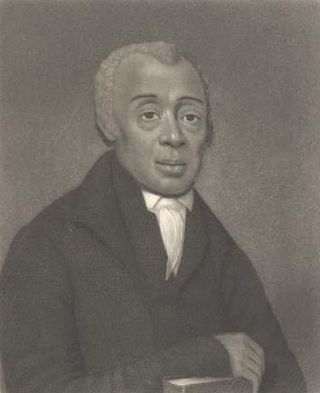
Richard Allen was a minister, educator, writer, and one of the United States' most active and influential black leaders. In 1794, he founded the African Methodist Episcopal Church (AME), the first independent Black denomination in the United States. He opened his first AME church in 1794 in Philadelphia.
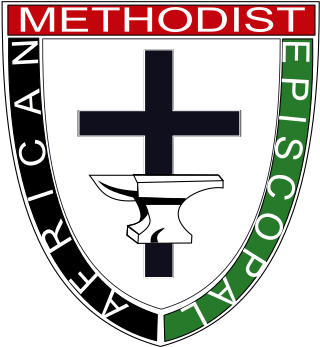
The African Methodist Episcopal Church, usually called the AME Church or AME, is a Methodist Black church. It adheres to Wesleyan-Arminian theology and has a connexional polity. The African Methodist Episcopal Church is the first independent Protestant denomination to be founded by black people; though it welcomes and has members of all ethnicities.
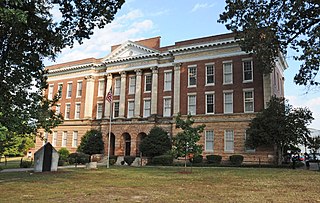
Lane College is a private historically black college associated with the Christian Methodist Episcopal Church and located in Jackson, Tennessee. It offers associate and baccalaureate degrees in the arts and sciences.

The African Methodist Episcopal Zion Church, or the AME Zion Church (AMEZ) is a historically African-American Christian denomination based in the United States. It was officially formed in 1821 in New York City, but operated for a number of years before then. The African Methodist Episcopal Zion Church adheres to Wesleyan-Arminian theology.
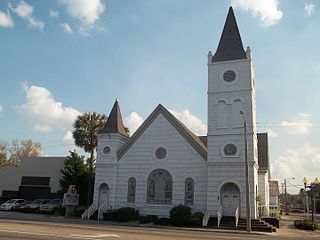
The black church is the faith and body of Christian denominations and congregations in the United States that minister predominantly to, and are led by, African Americans, as well as these churches collective traditions and members. The term "black church" may also refer to individual congregations in traditionally white denominations.
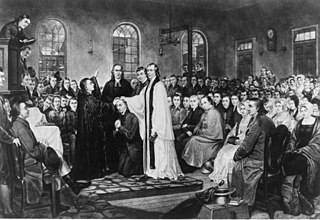
The Christmas Conference was an historic founding conference of the newly independent Methodists within the United States held just after the American Revolution at Lovely Lane Chapel in Baltimore, Maryland, in 1784.

Barratt's Chapel is a chapel located to the north of Frederica in Kent County, Delaware. It was built in 1780 on land donated by Philip Barratt, owner of Barratt Hall, and a prominent local landowner and political figure. Barratt, who had recently become a Methodist, wanted to build a center for the growing Methodist movement in Delaware.

John Early was instrumental in organizing the Methodist Episcopal Church, South, and was their bishop from 1854.
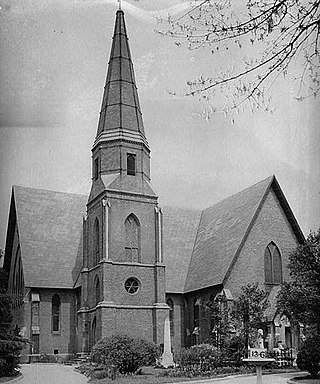
Christ Church (Episcopal) is an Episcopal church in Greenville, South Carolina, United States. which was consecrated in 1854. The church and its courtyard are listed on the National Register of Historic Places as Christ Church (Episcopal) and Churchyard. It is the oldest organized religious body and the oldest church building remaining in Greenville.
Methodist views on the ordination of women in the rite of holy orders are diverse.

John Wesley Methodist Episcopal Church is a historic church at 101 E. Court Street in Greenville, South Carolina, United States. The church was founded in 1866 by James R. Rosemond, who was a former slave. It was originally named Silver Hill United Methodist Episcopal Church, and was renamed after John Wesley in 1902.

The history of Methodism in the United States dates back to the mid-18th century with the ministries of early Methodist preachers such as Laurence Coughlan and Robert Strawbridge. Following the American Revolution most of the Anglican clergy who had been in America came back to England. John Wesley, the founder of Methodism, sent Thomas Coke to America where he and Francis Asbury founded the Methodist Episcopal Church, which was to later establish itself as the largest denomination in America during the 19th century.

Vardry Echols McBee was an American saddlemaker, merchant, farmer, entrepreneur and philanthropist who has frequently been called, "the father of Greenville, South Carolina".

The Emanuel African Methodist Episcopal Church, often referred to as Mother Emanuel, is a church in Charleston, South Carolina. Founded in 1817, Emanuel AME is the oldest African Methodist Episcopal church in the Southern United States. This, the first independent black denomination in the United States, was founded in 1816 in Philadelphia, Pennsylvania.

John Wesley Alstork was an American religious leader and African-American community organizer. He was a preacher and bishop in the African Methodist Episcopal Zion Church and is considered one of the most successful bishops of his church, in part due to his skills at organizing national conferences. He also was a trustee at several schools for African-Americans, and a businessman. He lived in Montgomery, Alabama.













